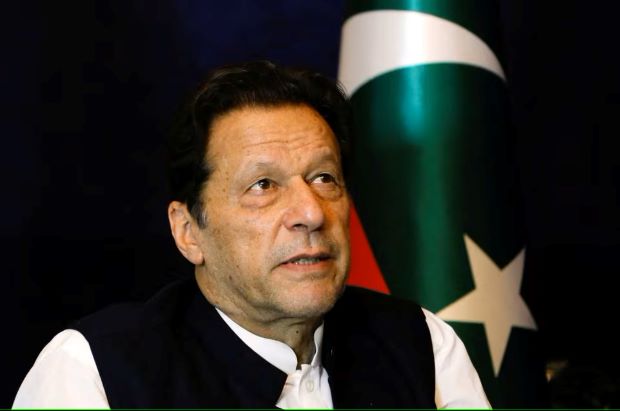Imran Khan sentenced to 10 years before Pakistan’s elections

By Christina Goldbaum
LAHORE — Former Prime Minister Imran Khan of Pakistan was sentenced to 10 years in prison Tuesday (30), the latest twist in what is widely seen as a campaign by the military to sideline one of its leading critics.
The sentence, delivered in a case in which Khan is accused of leaking state secrets, came about a week before Pakistan is set to head to the polls for the first national election since he was ousted in a vote of no confidence in April 2022.
Analysts have called the election among the least credible in Pakistan’s 76-year history because of the military’s widespread crackdown on Khan and his supporters.
His ouster set off a political showdown between Khan, 71, and the powerful military — long the invisible hand guiding the country’s politics — that has left Pakistan in crisis for a year and a half. Khan and his supporters have accused military leaders of orchestrating his removal — an accusation they deny.
As Khan and his backers have railed against the country’s generals, his popularity has remained high and public anger at the military has swelled. In May, hundreds of protesters attacked military installations in scenes that were once unimaginable in Pakistan.
In response, the military launched a widespread intimidation campaign aimed at weakening Khan’s political party, Pakistan Tehreek-e-Insaf, or PTI, and curbing the remarkable political comeback he has made even as he has been jailed in several legal cases and barred from contesting the national election next week.
The verdict Tuesday was handed down by a special court that was established last year and that analysts say is more deferential to the military’s wishes. Khan has called the trial a “fixed match”, suggesting its outcome was predetermined, and his party said it would appeal the verdict.
“This 10-year sentence won’t stand for 10 days before the appellate courts. Such brazen disregard of law and constitution has never been witnessed before,” Taimur Malik, one of the lawyers for Khan, said in a post on X, formerly known as Twitter.
Shah Mahmood Qureshi, a former foreign minister and close aide to Khan, was also handed a 10-year sentence Tuesday in the same case.
The verdict comes amid a particularly contentious election cycle in which analysts say the military has sought to gut Khan’s support and pave the way for a victory by the Pakistan Muslim League-Nawaz, or PMLN, the party of former Prime Minister Nawaz Sharif.
While it is not the first time the military has taken such action in an election, its meddling has been more visible than ever before, observers say.
In recent months, members of Pakistan’s elite — once considered safe from military harassment — have been arrested after expressing support for Khan, a populist former cricket star.
His party has been barred from using its iconic cricket bat symbol to identify its candidates on ballots — a crucial blow in a country where illiteracy is high and visual cues are critical for many voters to identify candidates. Most PTI leaders have resigned from the party under pressure from the military, they say.
Khan’s bitter rival Sharif, who fell out of favour himself with the military before leaving office in 2017, was living in exile until he was allowed to return to the country late last year — a move many saw as a military-led effort to bolster support for its preferred party in this election cycle.
The military’s ramped-up intervention in politics has drawn an unusually fierce public response. Videos criticizing the generals’ repression of PTI have circulated on social media — outside the reach of the military’s censorship machine. Khan’s rhetoric blasting the country’s generals by name has also deepened young people’s disillusionment with Pakistan’s political system.
Khan and PTI maintain widespread popular support across the country, analysts say. The economic downturn currently gripping Pakistan has added to the frustration with the military and the country’s other main political parties, including PMLN, which led the coalition government that took over after Khan’s ouster.
“Certainly, what we are feeling is the growing discontent among the people, growing discontent with the power structure and what is happening now,” said Zahid Hussain, a political analyst in Islamabad. “Pakistan society wants some kind of change.”
Despite that growing frustration, the military’s hand in shaping politics has only grown stronger in recent months, analysts say, as the country’s generals have sought to reassert control. The verdict Tuesday was widely seen as part of that effort.
It “sends a message to Mr. Khan’s party and supporters that they should not expect any reprieve,” said Asma Faiz, an associate professor of political science at Lahore University of Management Sciences.
Still, many of Khan’s supporters expressed outrage at the verdict and said that the repression of their party had only bolstered its support ahead of the polls.
“Everyone in the country knows that all the charges against Mr Khan are false and motivated by revenge,” said Shabbir Ahmed, a PTI member in Lahore, the capital of Punjab, the most populous province. “Mr. Khan’s supporters are politically aware now. They will seek revenge for all injustices against Khan through their votes on Feb. 8.”
-New York Times


Comments are closed, but trackbacks and pingbacks are open.